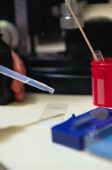 |
 |
 |
||
    |
||||
|
||||

Yale Lab Discovers New Gene-Based Syndrome
Mutation affects kidneys, brain and inner ear, study finds|
|
HealthDay
By Robert Preidt
Thursday, March 19, 2009
 TUESDAY, March 17 (HealthDay News) -- A new syndrome that features seizures, lack of coordination, developmental delay and hearing loss has been identified by Yale University researchers.
TUESDAY, March 17 (HealthDay News) -- A new syndrome that features seizures, lack of coordination, developmental delay and hearing loss has been identified by Yale University researchers.
The syndrome was identified during a genetic analysis of 600 people for causes of salt-handling defects in the kidney that lead to high or low blood pressure. Five people from four families in Afghanistan, Canada, Great Britain and Turkey were found to have a range of neurological problems, in addition to a salt-handling defect. Further analysis revealed that all five had mutations in the gene KCNJ10, a potassium channel expressed in the brain, inner ear and kidney.
In the kidney, the mutation affects the maintenance of the kidney's sodium pump, the major driver of salt reabsorption. In the brain, the mutation interferes with the ability to clear neurotransmitters and potassium from synapses, resulting in seizures. In the inner ear, the mutation affects sound transduction.
The researchers labeled the new syndrome SeSAME because of the problems it causes -- seizures, sensorineural deafness, ataxia, mental retardation and electrolyte imbalance. The findings are in this week's issue of the Proceedings of the National Academy of Sciences.
"Our ability to unequivocally and rapidly define new syndromes and their underlying disease genes has progressed dramatically in recent years," study author Richard Lifton, chairman of the genetics department at Yale School of Medicine, said in a Yale news release. "A study like this would have taken years in the past, but was accomplished in a few weeks by a single fellow in the lab." Ute Scholl, a postdoctoral fellow in Lifton's lab, made the discovery.
Lifton said he hopes that the finding will not only help doctors identify people with SeSAME but also recognize that people with apparently complicated syndromes might have simple, underlying defects.
HealthDay
Copyright (c) 2009 ScoutNews, LLC. All rights reserved.
Related News:
More News on this Date
Related MedlinePlus Pages:
| Home | Health Topics | Drugs & Supplements | Encyclopedia | Dictionary | News | Directories | Other Resources | |
| Disclaimers | Copyright | Privacy | Accessibility | Quality Guidelines U.S. National Library of Medicine, 8600 Rockville Pike, Bethesda, MD 20894 National Institutes of Health | Department of Health & Human Services |
Date last updated: 20 March 2009 |
